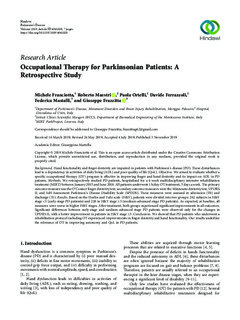Occupational Therapy for Parkinsonian Patients: A Retrospective Study
Franciotta, Michele; Maestri, Roberto; Ortelli, Paola; Ferrazzoli, Davide; Mastalli, Federica; Frazzitta, Giuseppe
Journal article

Åpne
Permanent lenke
http://hdl.handle.net/11250/2635520Utgivelsesdato
2019Metadata
Vis full innførselOriginalversjon
Michele Franciotta, Roberto Maestri, Paola Ortelli, Davide Ferrazzoli, Federica Mastalli, and Giuseppe Frazzitta. (2019) Occupational Therapy for Parkinsonian Patients: A Retrospective Study. Parkinson’s Disease, 2019, Article ID 4561830. https://doi.org/10.1155/2019/4561830Sammendrag
Background: Hand functionality and finger dexterity are impaired in patients with Parkinson’s disease (PD). These disturbances lead to a dependency in activities of daily living (ADL) and poor quality of life (QoL).
Objective: We aimed to evaluate whether a specific occupational therapy (OT) program is effective in improving finger and hand dexterity and its impact on ADL in PD patients.
Methods: We retrospectively studied PD patients, hospitalized for a 4-week multidisciplinary intensive rehabilitation treatment (MIRT) between January 2015 and June 2018. All patients underwent 1 h/day OT treatment, 5 days a week. The primary outcome measure was the O’Connor finger dexterity test; secondary outcome measures were the Minnesota dexterity test, UPDRS II, and Self-Assessment Parkinson’s Disease Disability Scale (SPDDS). These measures were assessed at admission (T0) and discharge (T1).
Results: Based on the Hoehn and Yahr scale (H&Y), patients were divided into two groups: 262 subjects in H&Y stage <3 (early-stage PD patients) and 220 in H&Y stage ≥3 (medium-advanced stage PD patients). As expected, at baseline, all measures were worse in higher H&Y stages. After treatment, both groups experienced significant improvements in all outcomes. Significant differences between early-stage and medium-advanced stage PD patients were observed only for the changes in UPDRS II, with a better improvement in patients in H&Y stage ≥3.
Conclusions: We showed that PD patients who underwent a rehabilitation protocol including OT experienced improvements in finger dexterity and hand functionality. Our results underline the relevance of OT in improving autonomy and QoL in PD patients.
